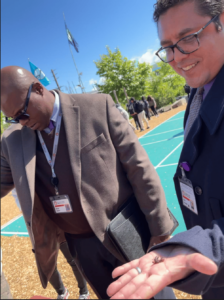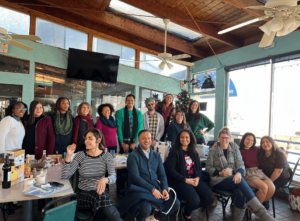Charter school oversight is evolving. What once entailed mostly emergency interventions and petition renewals every five years, is becoming a more thoughtful practice with the goal of helping charter schools and students to succeed. With this newsletter, CCAP begins a new feature profiling California authorizers that are reshaping the authorizer-charter school connection.
Indra Ciccarelli’s priorities have not changed, but he has refined the approach to working on them.
Before COVID, Ciccarelli, Director of the Charter Schools Office at the Los Angeles County Office of Education (LACOE) and CCAP board member, held two big conferences a year with LACOE-authorized charter schools. When it was no longer possible to gather in person, he turned to weekly Zoom meetings and quickly realized that they were more efficient and effective.

Indra Ciccarelli, Director of the Charter Schools Office, Los Angeles County Office of Education
The three main purposes of the conferences were to provide charter school leaders with professional development, update legislation and regulations, and build relationships. More frequent Zoom meetings met those purposes “better than the conference did,” noted Ciccarelli.
“People talk about going back to normal, okay, but I don’t want to go back to the way things were,” said Ciccarelli. Instead, he asked himself some practical questions: “Can we take some lessons learned [during COVID] and build back better? Can we come back from this better than what it was before?”
The Zoom meetings remained. Zoom meetings could target specific groups of charter school staff for professional development and updates that are relevant for their work. Conferences, however, were usually attended by charter school leaders and not necessarily the people who needed the information being presented, said Ciccarelli.
“I was giving them professional development on English learner master plans, but really the EL coordinators should have been there for that, right. Or I’d give them something on special education, but really the special education coordinators should have been there,” he explained.
The virtual meetings have since become biweekly; still frequent enough to provide charter schools with the most current information, answer questions and review data.
“Now, I’m able to give them updates as they’re happening in little bits, so it’s more timely and it’s in smaller pieces so the retention is higher,” explained Ciccarelli.
Another plus: Zoom meetings can be recorded and put online for anyone who missed them.
“I’ve told my staff here in LACOE, ‘I’m never going back to the conference thing, that just didn’t work,” said Ciccarelli. “The feedback we’ve gotten from the schools is that they appreciate it and like it a lot more.”
The weekly, and now biweekly, meetings have been “incredibly helpful” for Farnaz Golshani Flechner, Executive Director and CEO of Environmental Charter Schools, which has two middle schools and high school authorized by LACOE.

Farnaz Golshani Flechner (seated, far left) with the leadership team of Environmental Charter Schools
At the beginning of COVID, new policies and information [about COVID] were coming out daily, recalled Golshani Flechner. She was frustrated that superintendents of traditional schools were meeting online every week to get updates, while she and other charter schools were left out.
“It was really hard not to have a meeting like that, but within two weeks Indra stepped up and implemented a weekly meeting that was more focused on charter school needs,” concurred Golshani Flechner. “It’s been a really wonderful shift.”
Biweekly meetings also support Ciccarelli’s priority of building stronger relationships between the county office and its charter schools, and among the charter schools themselves.
“In this past year I’ve definitely seen an improvement in the way that we are collaborating as charter schools. There’s so much more of a network,” said Golshani Flechner.
They discuss health and safety regulations and share ideas to improve processes and systems, such as data collection, testing, and other resources.
“We all share examples of how we’re overcoming challenges in a quickly changing environment. Sometimes the resources they provide are useful to us and sometimes the resources we provide are useful to the other schools. It’s just constant information sharing,” she reported.
Golshani Flechner is pleased with the current relationship with LACOE and credits its charter school office with responding “to a lot of the feedback that we’ve given.” She does have a “dream scenario” where “a network of charter and traditional schools share information and best practices consistently and are resources for each other.”
That uncannily resembles Ciccarelli’s vision. He, too, wants all schools and students, both charter and traditional, under LACOE and the Los Angeles Unified School District authority, to feel supported and receive the resources they need.
Golshani Flechner is not surprised by the similarities. “Really, all of us have the shared goal of improving educational outcomes for our students. So, if there was more collaboration and knowledge sharing across the board, that would help us to better meet the needs of all students.”
